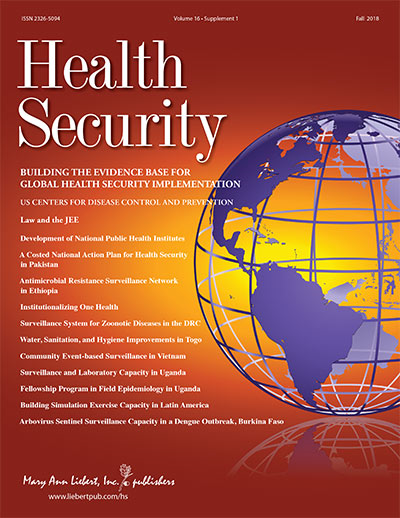CDC and partners build foundation of evidence base for global health security implementation in special supplement of Health Security
Center News

November 27, 2018 – As governments throughout the world develop and implement national action plans to increase their capacities to prevent, detect, and respond to health emergencies, experts at the US Centers for Disease Control and Prevention (CDC) and partners are working to develop a scientifically grounded evidence base of effective and measurable global health security interventions that can help guide future efforts.
The foundation of this work is detailed in a series of articles and commentaries in a special supplement to Health Security, “Building the Evidence Base for Global Health Security Implementation,” published Nov. 27 and produced in collaboration with the Johns Hopkins Center for Health Security.
In the articles, CDC and global health security partners describe outcomes and lessons learned from multiple countries throughout Africa, Asia, and Latin America that are implementing activities to enhance public health capacities in disease prevention, detection, and response. CDC and partners have gathered and are sharing these lessons on specific approaches and interventions that are most effective in enhancing a country’s capacity for health security. The world has, in recent years, seen a series of alarming public health emergencies that have resulted in thousands of lives lost and billions of dollars in economic losses.
The supplement’s articles are grouped into commentaries, and overview, prevent, detect, and respond sections.
Overview
- “Law and the JEE: Lessons for IHR Implementation”
- “Use of the Staged Development Tool for Assessing, Planning, and Measuring Progress in the Development of National Public Health Institutes”
- “Development of a Costed National Action Plan for Health Security in Pakistan: Lessons Learned”
Prevent
- “Establishment of a Sentinel Laboratory-Based Antimicrobial Resistance Surveillance Network in Ethiopia”
- “Institutionalizing One Health: From Assessment to Action”
- “Assessing the Surveillance System for Priority Zoonotic Diseases in the Democratic Republic of the Congo, 2017”
- “Strengthening Healthcare Facilities Through Water, Sanitation, and Hygiene (WASH) Improvements: A Pilot Evaluation of ‘WASH FIT’ in Togo”
Detect
- “Factors Influencing Community Event-based Surveillance: Lessons Learned from Pilot Implementation in Vietnam”
- “A Cross-Cutting Approach to Surveillance and Laboratory Capacity as a Platform to Improve Health Security in Uganda”
- “Strengthening Global Health Security Through Africa’s First Absolute Post-Master’s Fellowship Program in Field Epidemiology in Uganda”
Respond
- “Building Simulation Exercise Capacity in Latin America to Manage Public Health Emergencies”
- “Building Laboratory-Based Arbovirus Sentinel Surveillance Capacity During an Ongoing Dengue Outbreak, Burkina Faso, 2017”
As the nation’s health protection agency, CDC works with countries and partners around the world to build health security capabilities and keep America safe from deadly health threats. Global health security means investing in interventions, addressing gaps, and generating scientific evidence about the specific activities necessary to enhance a country’s health security capacity.
“Public health capacity development efforts are generally less costly and more effective than mounting a response operation in the midst of a crisis,” write Jennifer B. Nuzzo and Tom Inglesby from the Center for Health Security in their commentary for the supplement. “Therefore, investments in working to boost countries’ capacities should be seen as a cost-saving measure for governments, including the United States, which will be called on to respond during infectious disease emergencies.”
The full issue is available at liebertpub.com.
About Health Security:
Health Security, published by Mary Ann Liebert, Inc., is a bi‐monthly peer‐reviewed journal, now in its 16th year of publication. It serves as an international forum for debate and exploration of the key strategic, scientific, and operational issues posed by biological weapons, pandemics and emerging infectious diseases, natural disasters, and other threats to global health. The journal provides multidisciplinary analyses and perspectives essential to the creation of strategies and programs that can diminish the consequences of health emergencies, epidemics, and disasters. Center Director Tom Inglesby, MD, is the journal’s editor-in-chief, and Center Director of Publications Jackie Fox is managing editor.
About the US Centers for Disease Control and Prevention:
CDC works 24/7 protecting America’s health, safety, and security. Whether disease start at home or abroad, are curable or preventable, chronic or acute, or from human activity or deliberate attack, CDC responds to America’s most pressing health threats. CDC is headquartered in Atlanta and has experts located throughout the United States and the world.
About the Johns Hopkins Center for Health Security:
The Johns Hopkins Center for Health Security works to protect people from epidemics and disasters and build resilient communities through innovative scholarship, engagement, and research that strengthens the organizations, systems, policies, and programs essential to preventing and responding to public health crises. The Center is part of the Johns Hopkins Bloomberg School of Public Health and is located in Baltimore, MD.
